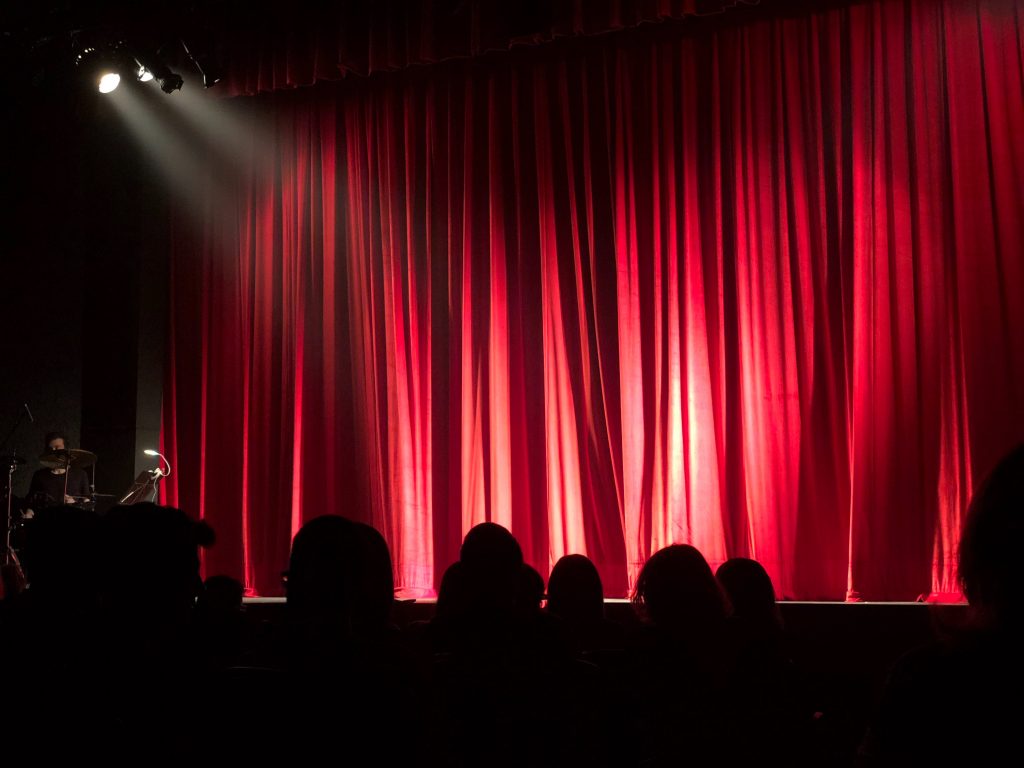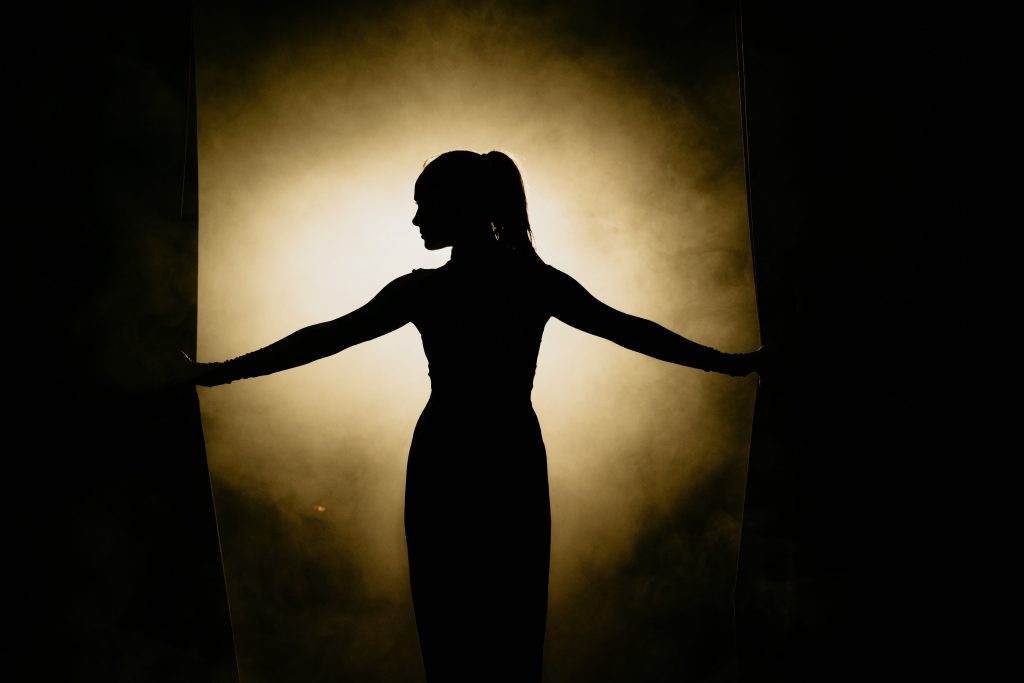There are audiences–there are fans–and then, there are the die-hards. The familiar faces in the front-row, back to live the magic once more. Whether they’re life-long lovers of the performing arts who can’t get enough of their favourite play, or accidental aficionados who just happened to chance upon a production that immediately got under their skin–these theatre buffs all have a story about a play that pierced through to their soul, and just demanded to be re-lived, again and again.
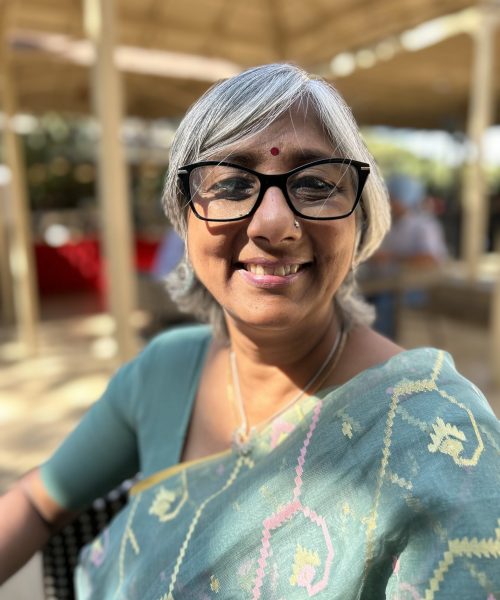
01. CHAMPA SAHA
Champa Saha was an educator at Head Start Montessori in Bengaluru at the same time that Abhishek Majumdar was part of the school’s theatre faculty. As such, she had the opportunity to attend some of the first rehearsals of what would become his critically-acclaimed exploration of religion, politics and morality: Muktidham. Still, it wasn’t until she watched a complete performance that she was able to appreciate the poetry inherent in the dialogue. “I was mesmerised by the words,” she expresses, “The patterns, the rhythms, the visuals they conjure… right after the first show, I made up my mind to watch it again.” After her second viewing, Saha realised she’d been so enthralled by the language that she hadn’t paid much attention to the set design or costumes, and decided she needed to watch it once more. “I went back again and again, and each time I found myself focusing on new aspects,” she laughs. Saha has now watched the play six times, and believes she finally has a holistic impression of it. “It is larger-than-life,” she says, “The language, the music, the set, all come together to make a very special production, and it certainly leaves its mark. Even as I am talking about it, I am smiling–I so loved watching it.”
Next up: A make-up artist talks about the play that has her literally falling off her seat with laughter, no matter how many times she watches it.
—
02. BILLY MANIK
Make-up artist Billy Manik grew up right next to Mumbai’s Prithvi Theatre, and as such, has been an avid theatre-goer her whole life. “Someone portraying everything in front of you, all kinds of emotions, while you’re sitting there, is definitely very compelling,” she expresses. One of Manik’s favourite plays is AKVarious’ Dekh Behen, which she has seen five times. “I love the subject,” she says, “I love how it’s got fun, it’s got drama and it’s got a message.” Manik first went to watch the play because it was co-written by her close friend, Dilshad Edibam Khurana, along with Tahira Nath Krishnan. The rewatches, however, were motivated by the simple fact that she enjoyed herself so much. “I was literally falling off my seat laughing,” she says, “There was a point my friend had to hold me, because I couldn’t contain myself.” Manik has now taken her parents, her friends. “Every time I recommend it to somebody, I go along with them,” she laughs. Over time, some performers have changed, and the comedic delivery changes with them–but Manik insists she has always laughed just as much each time. “I love the entire essence of the show,” she adds, “It’s just really fun to hear a room full of women gossiping.”

Up next: A retired banker and theatre reviewer talks about the play that still gives him goosebumps every time he watches it.
—
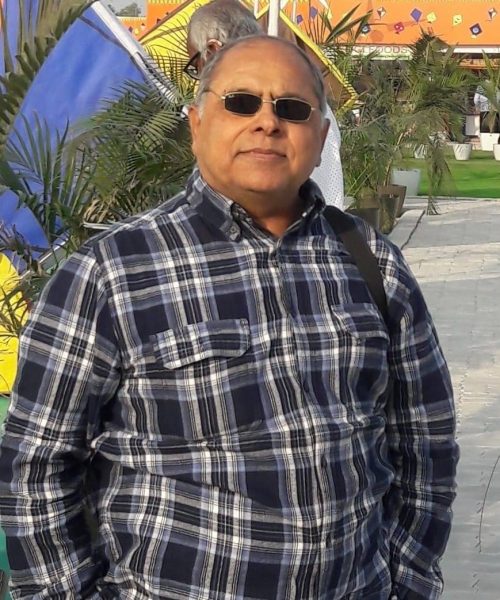
03. NARESH GULATI
Naresh Gulati has been a theatre enthusiast ever since he acted in his first school play, and has been in about 20 amateur productions since (”though I don’t remember the exact count right now,” he admits). The retired banker, who also reviewed theatre in his spare time, remembers the hype that surrounded Swadesh Deepak’s Court Martial when it first came out in 1991, specifically because it drew attention to the issue of casteism in the army. Gulati watched two performances of the play in Jammu–one produced by a local group and a second Punjabi adaptation by Manch Rangmanch–and later saw a production directed by Arvind Gaur in the early 00s. “This play has always mesmerised me,” he says, “The story is of course, first and foremost, but the characters are extremely compelling. I still get goosebumps when I recall the way Ramchandran’s character speaks.” Part of Gulati’s impulse to go again was a desire to compare how different actors would portray these roles–but it was always the text that reigned supreme. “The way the play proceeds, unfolds, and leads to the climax, is very impressive, from beginning to end,” he adds, “Perhaps that is what makes you want to watch it again, whenever you get the opportunity.”
Up next: A design educator talks about the play that drew them into the digital world of experimental theatre.
—
04. SHEMAL PANDYA
Design educator Shemal Pandya was never much of a theatre-goer growing up, and started watching plays primarily because their friends dragged them to performances around Mumbai. Now part of the exhibition design faculty at Ahmedabad’s National Institute of Design, Pandya admits they’ve started to enjoy the performance arts a lot more: “solo performances, stand up, everything around theatre,” they explain. One play they’re especially intrigued by, however, is Samuel Beckett’s Waiting for Godot. “I had read the text when I was studying about existentialism,” they explain. “I love the absurdity of it.” The first performance they saw was a recording of a 1988 production directed by Walter D Asmus and performed by the San Quentin Players. They then saw an undergraduate production by students of CEPT University, and finally, watched an Instagram Live performance by Mumbai-based models Ankit Verma and HUMHU. “I’d love to see more versions of it, just to see how different people respond to the same idea,” they add. Even though Pandya admits to being a “traditionalist” when it comes to theatre, they’re grateful for how digital formats have offered them the opportunity to experience so many varied performances of the play. “Every viewing and every adaptation makes me think more about who–or what–is Godot,” they say.
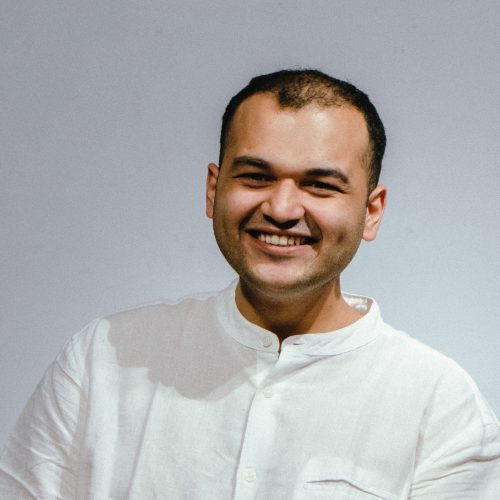
Up next: Another educator talks about the larger-than-life musical spectacle that makes her happy in her soul.
—
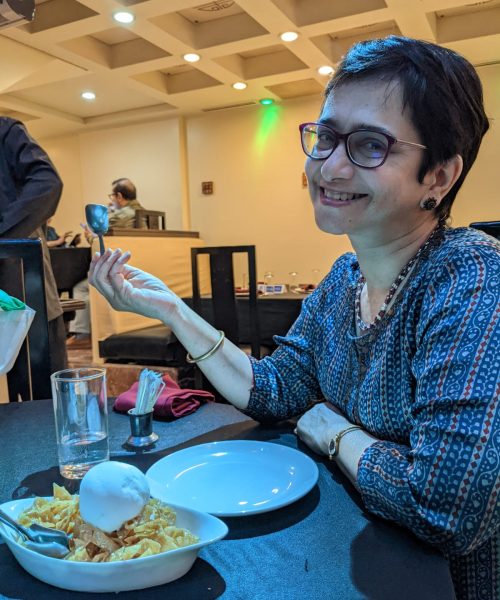
05. ANJALI TELANG
Anjani Telang’s parents started taking her to watch Marathi “natya sangeet” when she was very young, and she has always found live theatre to be a thrilling experience. “It introduced me to a range of emotions that I wasn’t aware existed,” she expresses, “There was something about the way people would come on the stage, be someone who they weren’t, and convey emotion with so much confidence that was just fascinating for me.” As an adult, Telang continues to be just as enamoured by plays that showcase spectacles of dance, choreography or music. Sunil Shanbag’s Stories in a Song, for instance, is a play she has watched three times and would happily go for again. “It’s such an enormous experience,” she says, “Just one viewing is not enough to grasp all of it, to get the magic of it all.” While Telang is particularly drawn to the music in the play, she also finds that the play’s broken, interlaced narrative style makes for an easy and compelling rewatch. “So many small things come together—the set design, the way the actors stand, the way they use dialogue and narration,” she explains. “I find all of that very entertaining. My soul is just very happy at the end of it.”
Up next: A mental health practitioner talks about catching her favourite musical in multiple cities around the world.
—
06. PERVIN DADACHANJI
Mumbai-based psychiatrist Pervin Dadachanji has fond memories of going to the theatre with her uncle, when she was a teenager. “I have watched Evita, and Jesus Christ Superstar–all the Alyque Padamsee and Pearl Padamsee productions,” she says, “and it was great because he always bought tickets in the front row, because he had a problem with his eyes.” When Dadachanji started traveling abroad, as an adult, she had an opportunity to watch these musicals in their native habitat, on Broadway and the West End. Already a fan of the music in Andrew Lloyd Webber’s classic Phantom of the Opera, Dadachanji made it a point to catch a live performance during a five-day visit to New York. “That first experience was fantastic–I didn’t even know about the chandelier that falls,” she says. She watched the play for a second time during a family trip to Dubai, and most recently, during the covid lockdown, watched a recording of a special 25th anniversary celebration show that reunited former cast members. “The productions are really grand and large-scale, but for me it’s all about the music,” she says, “Out of all of Andrew Lloyd Webber’s work, this is absolutely my favourite, and I could still watch it again.”

Up next: A video editor expresses how she can’t get enough of the raw spontaneity of her favourite play.
—
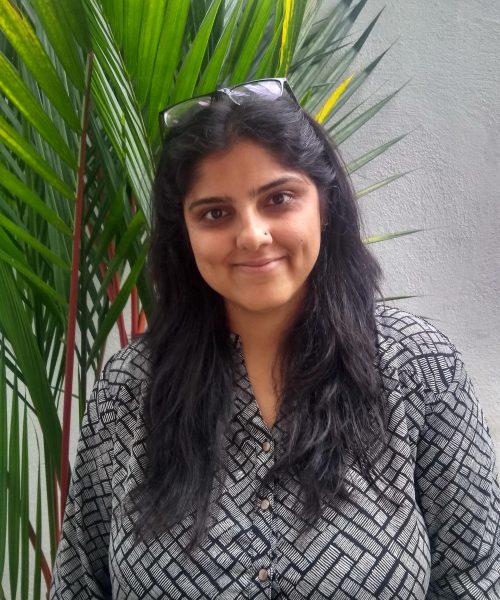
07. NEHA MEHRA
Theatre was a big part of video editor Neha Mehra’s life growing up in Chandigarh. “I really enjoyed the form because it is so spontaneous, even though its highly rehearsed,” she says, “There’s no second chance, there’s no second take, so that’s why it’s so thrilling to watch it unfold.” Mehra is especially admiring of nuanced staging that can direct an audience’s attention without the cinematic crutch of close-ups and angled shots. “In theatre, it is up to you who you focus on,” she says, “So in a sense, you are creating the edit for yourself. Depending on whether you’re looking at the person who is talking, or the person who is reacting, your experience changes.” Now based in Mumbai, Mehra makes it a point to take visiting friends and family to the theatre, whenever she can. Her favourite play to introduce them to is AKVarious’ Rafta Rafta, which she has now seen seven times. “It has some very understated, beautiful moments, and a lot of great non-verbal communication,” she says, “It is interactive in its own way. The actors bring something new every time they perform it, so as an audience, you have to be very present to catch that.”
—
It’s interesting to think about how people’s professional identities tend to impact their appreciation of theatre. A video editor, who is so used to cutting and colour-correcting and meticulously perfecting cinema, loves live theatre specifically for its spontaneity. An educator and academic who cautiously approaches the performing arts through familiar, text-based territory, finds that live theatre opens the floor to new interpretations. What this drives home, at least to me, is the fact that no matter what you’re looking for when you consume a work of art–whether it’s larger-than-life spectacle or intimate, nuanced dialogue–the theatre has something to offer everyone. It’s all the arts rolled into one, and no matter how many times you’ve watched a play: every single performance will still feel brand new.
Do you have a favourite show you can’t get enough of? A play you’ve watched several times – and would still happily watch again? Share your stories in the comments below!





